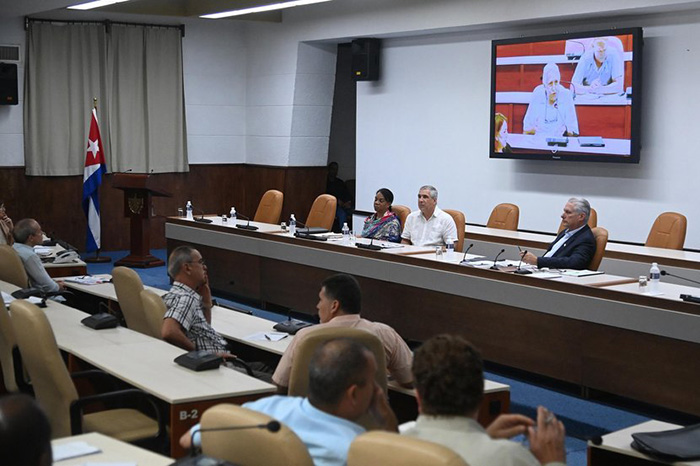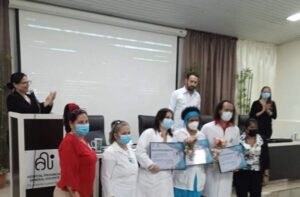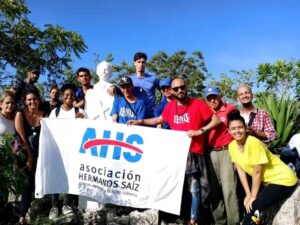History, culture, tradition and, of course, economy. Perhaps these words sum up the importance of the sugar agro-industry for the Greater Antilles.
It was this topic – important for Cuba – that was the focus of this May’s session of the National Innovation Council (CNI), which met recently in the Plenary Hall of the Palace of the Revolution, and which was headed by the First Secretary of the Central Committee of the Communist Party of Cuba and President of the Republic, Miguel Díaz-Canel Bermúdez.
The starting point for the analyses was a strategic project, presented by the Azcuba Sugar Group and entitled «Introduction of new technologies to increase sugar production and its derivatives». The motivation was to pool ideas, in a day that was also attended by the member of the Political Bureau and Vice-President of the Republic, Salvador Valdés Mesa, as well as the Deputy Prime Ministers of the Republic, Inés María Chapman Waugh, and Eduardo Martínez Díaz.
In her argument on the need for a strategic plan at the current time in the country, the Vice-President of the Azcuba Sugar Group, Mariela Gallardo Capote, recalled that sugar cane, which is the mainstay of the sugar industry, has had a downward trend in its production levels, and that the industry has experienced a progressive erosion. The engineer emphasised the relevance of finding ways of financial economic support to enable the sustainability and growth of the important sector.
According to the proposal presented, the aim is to increase export revenues, which would make it possible for the sector to grow and thus contribute to the country’s economy, and that this endeavour should be based on the implementation of technological, financial and organisational innovations.
The plan presented by Mariela Gallardo Capote includes components such as Science, Technology and Innovation projects, Foreign Investment and Innovation Investment programmes, as well as International Cooperation projects. It is important, she said, to resize the sugar industry, which is present in 50 municipalities in the country.
In defining the proposed goals, the vice-president of Azcuba expressed that they are very high but achievable, taking into account the potentialities that distinguish the sugar cane activity and its workers.
Among these strengths, Capote Gallardo referred to the circular economy, defined by the expert as the basis of the sector’s development system. In this sense, he reflected that from sugar cane it is possible to obtain electrical energy, it is possible to create sugar and its derivatives, which, once the specific goals of the project have been met, would allow the sugar industry to recover its role as a contributor of foreign currency to the national economy.
The speaker did not overlook the key challenges of sugar cane production: she referred to economic challenges, such as obsolete infrastructure and low production levels; environmental challenges, such as the vulnerability generated by climate change; and social challenges, such as the high fluctuation of the workforce.
This was followed by the voices of the experts who are members of the CNI, from whose criteria emerged ideas such as the need to leave behind the traditional vision of this sector, to conceive it as a strategic space for energy transition and the production of food and derivatives with high added value, based on a circular economy approach that contributes to energy security and environmental sustainability.
More than one reflection was dedicated to sugarcane producers, a key force in the whole process, with the certainty that all inertia must be broken based on a correct stimulus approach that includes, among other variables, the prices defined for production.
The emphasis was also placed on the energy analysis and the opportunity that a sugar mill offers in this regard, not only for a harvest period, but also for the whole year, with an eye, for example, on sugar cane and forest biomass.
Dr. C. Jorge Núñez Jover’s comment was particularly valuable, suggesting that the project should include a careful look at the transformation of the communities where the agro-sugar industry is developed. It is vital, he warned, to take into account local and provincial development strategies, incentives for producers and inhabitants – even if they do not work directly in the mills – and, in general, everything that means repopulating rural areas based on a sense of belonging.
Because of what it represents in more than 500 years of Cuban history, because it is a tradition that has influenced many generations, because the sugar agro-industry has been the heart of many communities throughout the country, President Díaz-Canel Bermúdez stated that the project’s implementation plan is strategic in order to reverse the current situation, and therefore proposed adding to the proposal seen in the CNI all the ideas that could strengthen it and make it viable in the shortest possible time.
Taken from Presidency




